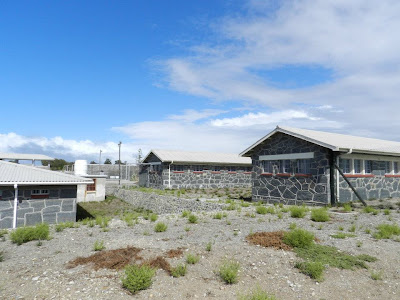The Dutch students wanted to assess what effect our sports programme is having on the local children in the area - not just as far as sports skills extend, but also in confidence building, health awareness and life skills. They will eventually ask questions of the children we work with, but before this, they needed to do the same with a control group. We headed to Pineview, a local area that we don't hold sports club, and set up to do a normal sports session and then the questionnaire...
...However, it transpired that we were working with children that usually take part in another day club in the holidays, run by a local woman. She was less than pleased and after some quite aggressive shouting in Afrikaans, she ended up taking the children with her. If it was the case that we'd taken children away from her programme then we would have been suitably apologetic but it was pretty clear that the fact we were white had first and foremost created the tension. She certainly didn't want to talk to us and we went away feeling quite shocked by the whole thing. It was a harsh reminder that although we are a white run charity and we hold very good relations with the local community, there are still veins of racial resentment running through black and coloured communities here in South Africa. Unsurprising, given the national history of racial inequality in South Africa, there is still a deep seated mistrust of white people amongst some people here.
I continued to think about what happened throughout the week, wrestling between an apathetic understanding of such animosity, but also a frustration at being treated as such, when I feel so far removed from racism in sentiment and opinion. All these thoughts became even more pertinent on our visit to Robben Island on Saturday...
 |
| Prison blocks, originally built by prisoners as part of hard labour |
Robben Island, just off the coast of South Africa from Cape Town, was used as a prison from the time of Dutch settlement in the 1600s. It housed millions, from criminal prisoners, to lepers and the mentally ill (1800s), exiled from mainland society. But during the apartheid it became the epitome of racial oppression as political prisoners from such break away parties as the ANC the PAC were imprisoned in harsh conditions.
This of course included South Africa's first democratic president, Nelson Rolihlahla Mandela from 1964, for eighteen years. Political leaders such as Mandela were housed in solitary confinement to avoid them impressing on others. All prisoners were forced into hard labour in a limestone quarry and made to sleep on the floor until 1975 when beds were introduced. Ironically the limestone quarry became known as a 'University' as it was the only time that all the prisoners could come together and while there they would share information and formulate ideas. Many of the laws and statutes that made up the later democratic government of Mandela, were drafted on Robben Island. Our guide, who was on the island from 1984, told us of how the prisoners stole newspapers where they could so, once back in their communal cells, they could read, discuss and analyse any political news.
 |
| Nelson Mandela's cell in solitary confinement |
To see the men who were once imprisoned on Robben Island take ownership of the story of that time, and tell it with defiance, was entirely uplifting. However, it also reinforced the sense I have had of the complicated path there must have seemed, and must still seem, towards the 'Rainbow Nation' so desired here in South Africa. Although the progress from the days of apartheid is undeniable, working in Grabouw every day with the riots and the experiences of this week has gone some way in revealing the obstacles that still lie in the way of complete racial equality- both physically, in economic situation, but also mentally, in the perspectives South Africans hold of one another and those from abroad, regarding skin colour. This uncertain future could seem daunting; but holding those men from Robben Island in mind - who were so oppressed and yet continued to fight until their vision won through in 1994, with the end of apartheid - you can't help but feel a sense of determination that further progress will come.


No comments:
Post a Comment